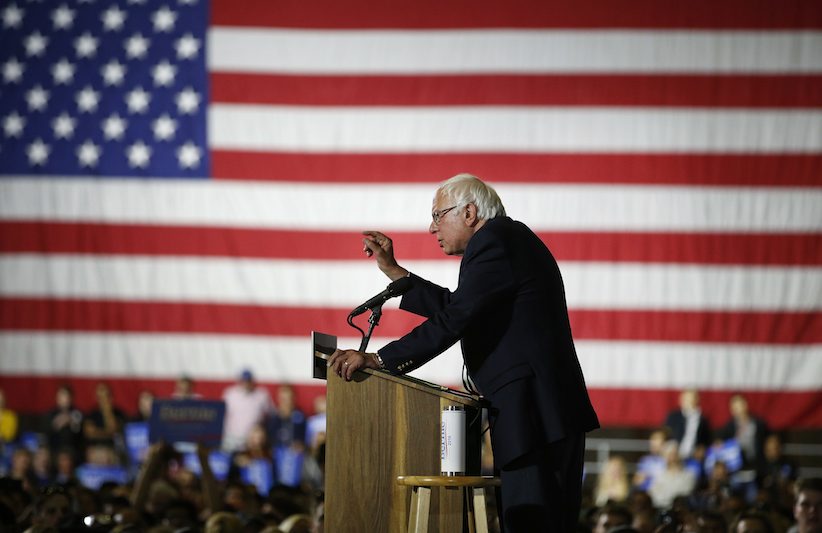Bernie Sanders: ‘The struggle continues’
Self-styled political revolutionary soldiers on, despite being eliminated
Democratic presidential candidate Sen. Bernie Sanders, I-Vt., speaks at a rally Tuesday, June 7, 2016, in Santa Monica, Calif. (AP Photo/John Locher)
Share

America’s self-styled political revolutionary remains on the battlefield after losing the war to Hillary Clinton.
Bernie Sanders isn’t ready to go.
He’s lost a majority of states in the Democratic primaries, the popular vote, elected delegates, unelected superdelegates, and he got clobbered Tuesday in the two biggest remaining states.
But an electric energy rippled through his youthful crowd as he declared his intention to march on — at least to the final primary next week in Washington, D.C., then perhaps to next month’s Democratic convention.
Sanders is reportedly bitter at his treatment by the Democratic party; feeling combative; and brushing aside his own staffers’ insistence on party unity, according to a story published on the Politico site.
“The struggle continues,” the senator told a California crowd.
“I am pretty good at arithmetic. I know that the fight in front of us is a very, very steep fight. But we will continue to fight for every vote and every delegate.”
The sound of the crowd hinted at Democratic disunity.
While his supporters cheered his reference to stopping Republican Donald Trump, they cheered even longer and louder when he said his campaign’s about something greater than defeating Trump — it’s about transforming the country with a platform of more social programs and less money in politics.
They booed Clinton.
On a night she made history as the first female presidential nominee of a major U.S. party, a Democratic audience jeered Sanders’ reference to receiving a gracious phone call from her.
Sanders raised his hands in a half-hearted effort to silence the boos.
Events over the next few days could determine whether the party finds harmony in the leadup to November’s election. After resting at home in Vermont, he’ll visit President Barack Obama on Thursday. That same day he meets with the top Democrat in the Senate. Early next week, the primaries officially end.
Sanders then has a choice to make about the Philadelphia convention: Will he be there to fight Clinton? Or simply to fight for his causes in the party platform and rulebook? All he said Tuesday was that he’d be fighting for his issues in Philadelphia — without specifying the capacity.
Some of his supporters offer another possible reason for his staying put: some suggest he’d be ready to step in if Clinton gets slapped with criminal charges amid the FBI investigation into her emails.
Clinton, for her part, extended an olive branch. She saluted her opponent for exciting people with a message of economic fairness and said she hoped to work with him.
She also referred to her own loss in a primary, eight years ago this week. After her last defeat in 2008, it took her a few days to withdraw and support Obama: “I know it never feels good to put your heart into a cause or a candidate you believe in, and to come up short. I know that feeling well.”
Clinton supporters express mixed degrees of patience with him.
At a rally this week, Chris Wikler urged understanding: “He can take his time to get out of the race in my view… He’ll do it gracefully.”
Standing beside him, his mom said Sanders should step down. Deb Tellier said: “He gave it a great shot. I appreciate that he really challenged her in ways that maybe she wouldn’t have been challenged. But I feel like, you know, it’s time. Let it go, man.”
The Republican nominee is working to drive a wedge into such divisions.
Trump repeated again that Sanders has been felled by a crooked system. He reiterated that he agrees with Sanders that trade deals are flawed and must be renegotiated.
And Trump offered those voters a message: “We welcome you with open arms.”
Polls suggest that up to one-quarter of Sanders supporters say they’d support Trump. Yet the vast majority say they wouldn’t. And if history’s any guide, these early election surveys are to be consumed with a generous sprinkling of salt.
Similar polls conducted early in 2008 found an even larger number of Clinton supporters insisting they’d never support their rival Obama and would back Republican John McCain.
Sanders hasn’t come as close to winning as she did in 2008.
But he noted that he’s gone from being a supposed fringe candidate to capturing 22 primaries, 10 million votes, overwhelming support from young people, and altering the country’s political conversation.
“Our vision,” Sanders said, “will be the future of America.”